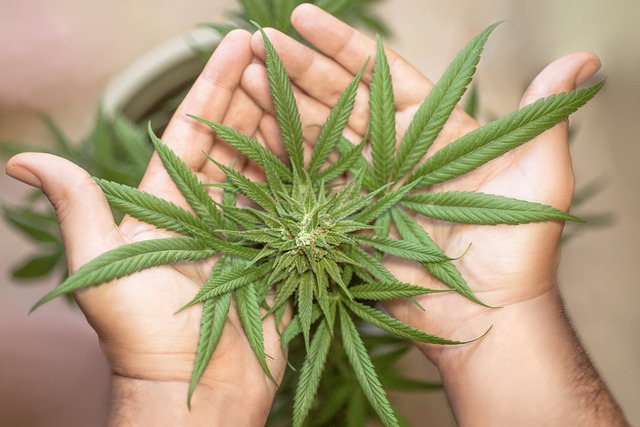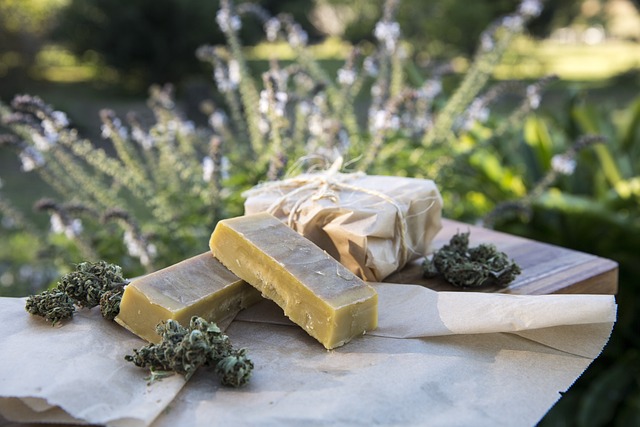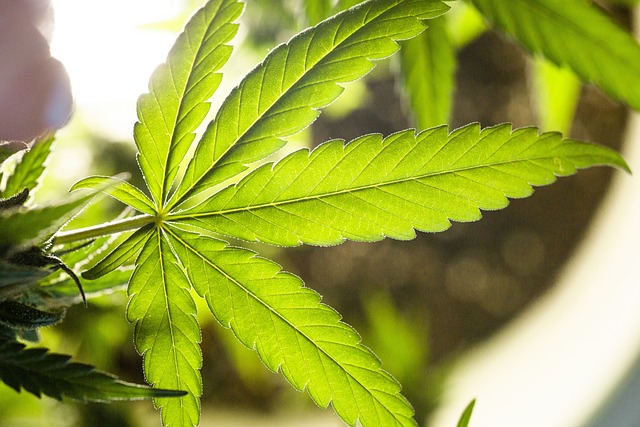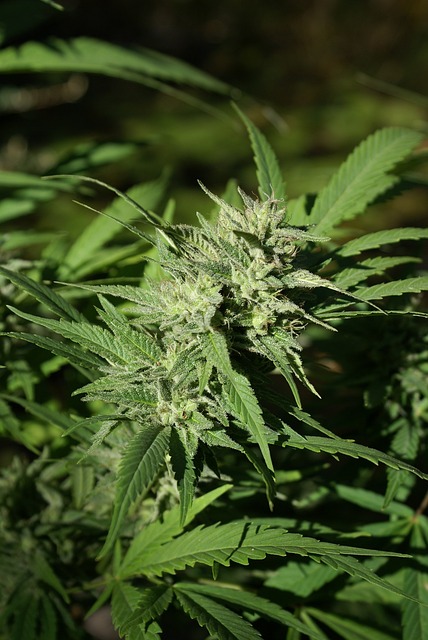The THCA flower, a non-psychoactive cannabinoid found in hemp and marijuana, has garnered attention for its potential to alleviate nausea. Its anti-nausea effects are attributed to its interaction with the endocannabinoid system, specifically targeting CB1 and CB2 receptors to regulate vomiting and nausea responses. Studies suggest that THCA flower's compounds could be particularly effective for nausea associated with gastrointestinal disorders and chemotherapy. Its psychoactive-free nature makes it an attractive option for those seeking relief from nausea without the mind-altering effects of cannabis. Ongoing research continues to evaluate THCA flower's therapeutic potential as a natural treatment for managing nausea, with its anti-nausea compounds being highlighted as a key focus area. Users are encouraged to follow proper dosing guidelines and choose consumption methods that suit their needs, such as vaporizing for precise control over intake. It is essential for individuals to consult with healthcare providers before incorporating THCA flower into their health regimen, ensuring it complements other treatments and addresses personal health requirements effectively.
Discover the natural potency of THCA flower, a botanical source rich in anti-nausea properties. This article explores how THCA flower can be a holistic addition to your wellness arsenal against nausea. Delve into the science behind its effects and learn how to incorporate this beneficial compound into your daily routine within the confines of legal regulations. With insights into its therapeutic benefits, this article serves as a comprehensive guide to harnessing the healing power of THCA flower for anti-nausea relief.
- Unveiling the Therapeutic Properties of THCA Flower: A Natural Approach to combating Nausea
- The Science Behind THCA Flower's Anti-Nausea Effects
- THCA Flower as a Holistic Remedy for Nausea: Benefits and Usage Tips
- Navigating the Legal Landscape of THCA Flower for Nausea Relief
- Integrating THCA Flower into Your Wellness Routine for Anti-Nausea Benefits
Unveiling the Therapeutic Properties of THCA Flower: A Natural Approach to combating Nausea

Unveiling the therapeutic properties of THCA flower, a non-psychoactive cannabinoid found in hemp and marijuana plants, offers a natural alternative for those seeking relief from nausea. The THCA molecule, which precedes tetrahydrocannabinol (THC) when heated, has been studied for its potential anti-nausea effects. Preclinical research suggests that THCA interacts with the body’s endocannabinoid system, influencing activities such as appetite and digestion, which are often compromised alongside nausea. This interaction may contribute to its efficacy in mitigating symptoms associated with gastrointestinal disorders, chemotherapy-induced nausea, and other conditions where nausea is a significant concern.
Furthermore, the anti-nausea compounds within THCA flower are believed to act on specific receptors in the brain, such as CB1 and CB2, which regulate various functions including vomiting and nausea responses. Unlike its psychoactive counterpart, THC, THCA does not produce a “high” effect, making it an appealing option for individuals who prefer a non-intoxicating remedy. The flower’s anti-emetic properties are being explored in various therapeutic contexts, offering hope to those who experience nausea as a chronic or acute issue. As such, the THCA found in cannabis flowers is gaining attention as a potential natural solution for managing nausea, with ongoing research further elucidating its potential benefits.
The Science Behind THCA Flower's Anti-Nausea Effects

THCA flower, which contains the non-psychoactive cannabinoid tetrahydrocannabinolic acid A (THCACA), has been recognized for its potential health benefits. Scientific research indicates that THCA, the precursor to THC (tetrahydrocannabinol), possesses a unique profile of anti-nausea compounds. These compounds interact with the body’s endocannabinoid system, a complex cell-signaling system identified in the late 1990s. The system’s discovery was groundbreaking for understanding the human body’s physiological processes and how phytocannabinoids like THCA can influence it. THCA flower’s anti-nausea effects are believed to stem from its ability to stimulate appetite, reduce inflammation, and alleviate stress on the gastrointestinal tract, which is often compromised in individuals experiencing nausea, particularly those undergoing chemotherapy. The mechanisms underlying these effects involve cannabinoid receptors found throughout the body, such as CB1 and CB2 receptors, which play a crucial role in modulating nausea and vomiting. Clinical trials have shown that THCA flower can help mitigate the symptoms of nausea, providing hope for those seeking natural alternatives to manage these often debilitating side effects of various treatments.
THCA Flower as a Holistic Remedy for Nausea: Benefits and Usage Tips

THCA flower, derived from hemp and rich in tetrahydrocannabinolic acid (THCA), has garnered attention for its potential anti-nausea properties. Unlike its psychoactive counterpart THC, THCA is non-psychoactive, making it a suitable option for those seeking relief without the high. The body’s endocannabinoid system, which plays a crucial role in regulating nausea and vomiting, can interact with the cannabinoids found in THCA flower. This interaction may help alleviate symptoms associated with various conditions that cause nausea, such as chemotherapy-induced nausea in cancer patients.
When using THCA flower for its anti-nausea compounds, it’s important to understand the correct dosing and methods of consumption. THCA flower can be consumed through smoking, vaporizing, or as an ingredient in edibles. For those averse to smoke, vaporizing offers a cleaner alternative that allows for precise dosing. It’s advisable to start with a low dose and gradually increase it based on individual tolerance and the severity of nausea symptoms. Additionally, combining THCA flower with other holistic remedies, such as ginger or chamomile, may enhance its effectiveness in managing nausea. Always consult with a healthcare provider before integrating THCA flower into your wellness regimen to ensure it complements any existing treatment plans and addresses your specific health needs.
Navigating the Legal Landscape of THCA Flower for Nausea Relief

THCA flower, which contains the non-psychoactive cannabinoid tetrahydrocannabinolic acid A (THCA-A), has garnered attention for its potential anti-nausea properties. As legal frameworks continue to evolve, individuals are increasingly exploring alternative treatments for nausea, including those derived from hemp and cannabis. THCA flower, rich in THCA-A, is one such option that has shown promise in providing relief from symptoms associated with nausea without the psychoactive effects typically found in its counterpart, delta-9-THC. The anti-nausea compounds present in THCA flower interact with the body’s endocannabinoid system, which plays a critical role in maintaining balance and regulating various physiological processes. Users report that THCA flower helps alleviate nausea, particularly in conditions where traditional treatments have been less effective.
Navigating the legal landscape of THCA flower for nausea relief requires careful consideration of local and state regulations. While hemp-derived products with less than 0.3% THC are federally legal in the United States under the 2018 Farm Bill, laws vary by state. It is imperative for consumers to be well-informed about their jurisdiction’s stance on cannabis and hemp derivatives. Additionally, when seeking THCA flower for nausea relief, it is advisable to source products from reputable suppliers to ensure potency and safety. Understanding the legal parameters not only ensures compliance with laws but also assures consumers of a therapeutic experience with THCA flower, potentially offering effective, natural relief from nausea.
Integrating THCA Flower into Your Wellness Routine for Anti-Nausea Benefits

Incorporating THCA (Tetrahydrocannabinolic Acid) flower into your wellness routine can be a beneficial addition, particularly for those seeking relief from nausea. The unique properties of THCA, which is the precursor to THC (Tetrahydrocannabinol), have been studied for their potential anti-nausea effects. Unlike its psychoactive counterpart, THCA does not induce a high but interacts with the body’s endocannabinoid system in a way that may alleviate symptoms associated with nausea and vomiting. This makes it a valuable option for individuals undergoing treatments like chemotherapy, which often cause these debilitating side effects. The anti-nausea compounds found in THCA flower are thought to work by stimulating appetite and reducing inflammation, which can further support overall well-being.
When integrating THCA flower into your routine, it’s important to consider dosage and method of consumption for optimal benefits. Consuming THCA flower through various methods such as vaporizing or smoking allows for faster onset of effects, while edibles or capsules may offer a more prolonged relief. Consulting with a healthcare provider is essential to determine the best approach for your specific needs, ensuring that this addition to your wellness routine is both safe and effective in helping manage nausea symptoms. Whether used alone or alongside other treatments, THCA flower’s potential anti-nausea compounds may provide a complementary therapy that enhances your health and well-being.
THCA flower has emerged as a promising natural remedy for those suffering from nausea, offering a compelling alternative to conventional treatments. The therapeutic properties of THCA flower, rich in anti-nausea compounds, provide a holistic approach to managing this common condition. As outlined in the article, the science supporting its efficacy is rooted in its interaction with the body’s endocannabinoid system, offering a natural and potentially effective solution. It is crucial for individuals considering THCA flower to navigate the evolving legal landscape carefully. By integrating THCA flower into one’s wellness routine, individuals may experience significant anti-nausea benefits, contributing to an improved quality of life. As with any health supplement, it is advisable to consult healthcare professionals before incorporating THCA flower into your regimen.
